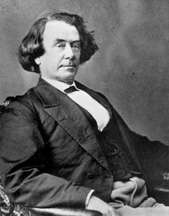Joseph S. Fowler
| Joseph Smith Fowler | |
|---|---|
 | |
| United States Senator from Tennessee | |
|
In office July 24, 1866 – March 4, 1871 | |
| Preceded by | Alfred O. P. Nicholson |
| Succeeded by | Henry Cooper |
| Personal details | |
| Born |
August 31, 1820 Steubenville, Ohio |
| Died |
April 1, 1902 (aged 81) Washington, D.C. |
| Political party | Republican |
Joseph Smith Fowler (August 31, 1820 – April 1, 1902) was a United States Senator from Tennessee from 1866 to 1871.
Fowler was born in Steubenville, Ohio. He graduated from Grove Academy in that city and subsequently from Franklin College in New Athens, Ohio in 1843. He taught school in Shelby County, Kentucky in 1844. He served as a professor of mathematics at Franklin College in Davidson County, Tennessee from 1845 to 1849. He studied law in Bowling Green, Kentucky and was subsequently admitted to the bar and practiced in Tennessee until 1861. He also served as president of Howard Female College in Gallatin, Tennessee from 1856 to 1861.
Fowler was an ardent Unionist. He served as State Comptroller of Tennessee from 1862 until 1865. The official Tennessee Blue Book states that the holder of that office during this period was "Joseph S. Foster". It is likely that the Biographical Directory is the correct source; the Confederate state government of Tennessee was never very effective and largely dysfunctional due to the early loss of much Tennessee territory to Union forces by the Confederates and also because neither the Confederacy nor slavery had ever had much public support in East Tennessee. Most of the state was under the control of the Union military government of Abraham Lincoln's appointed governor, Andrew Johnson, for most of the duration of the American Civil War; his government was fairly functional and it is likely that Fowler served this regime as Comptroller and that the Blue Book records his name erroneously.
In 1866 Tennessee became the first former Confederate state to be readmitted to the Union; the Tennessee General Assembly elected Fowler to the Senate, where his service began on July 24, 1866. Fowler became a part of the majority Republican caucus. In the 40th Congress he served as chairman of the Committee on Engrossed Bills.
During President Andrew Johnson's impeachment trial, Fowler broke party ranks, along with six other Republican senators, and in a courageous act of political suicide, voted for acquittal. These seven Republican senators were disturbed by how the proceedings had been manipulated in order to give a one-sided presentation of the evidence. Senators William Pitt Fessenden, Joseph S. Fowler, James W. Grimes, John B. Henderson, Lyman Trumbull, Peter G. Van Winkle,[1] and Edmund G. Ross of Kansas, who provided the decisive vote,[2] defied their party and public opinion and voted against impeachment. After the trial, Ben Butler conducted hearings on the widespread reports that Republican senators had been bribed to vote for Johnson's acquittal. In Butler's hearings, and in subsequent inquiries, there was increasing evidence that some acquittal votes were acquired by promises of patronage jobs and cash cards.[3]
He did not seek a subsequent term in the Senate upon the expiry of his term in 1871. He also did not return to Tennessee to live, but remained in Washington DC, practicing law there until shortly before his death in 1902. His remains were interred at Lexington Cemetery in Kentucky.
References
- ↑ "Andrew Johnson Trial: The Consciences of Seven Republicans Save Johnson".
- ↑ "The Trial of Andrew Johnson, 1868".
- ↑ David O. Stewart, Impeached: The Trial of President Andrew Johnson and the Fight for Lincoln's Legacy (2009), pp. 240-249, 284-299.
- United States Congress. "Joseph S. Fowler (id: F000324)". Biographical Directory of the United States Congress.
| United States Senate | ||
|---|---|---|
| Preceded by American Civil War (vacancy), previously Alfred O.P. Nicholson |
U.S. Senator (Class 2) from Tennessee 1866–1871 Served alongside: David T. Patterson, William G. Brownlow |
Succeeded by Henry Cooper |
